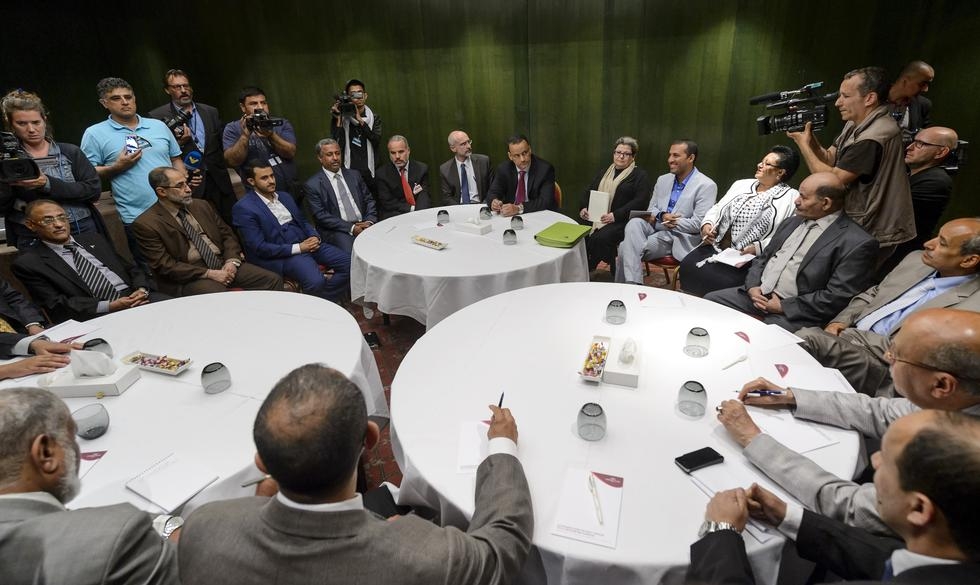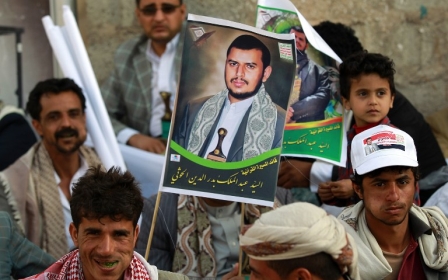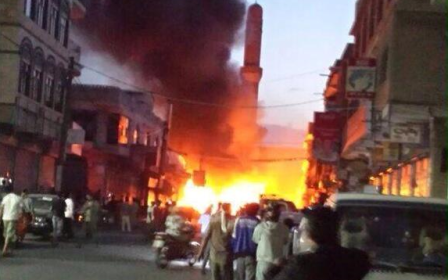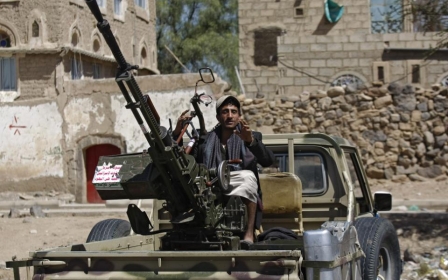UN extends Yemen talks as IS claims Sanaa blasts

The United Nations on Wednesday extended stalled Yemen peace talks taking place in Geneva, with both the exiled Yemeni government and the Iran-backed Houthi militia accusing each other of trying to sabotage the process.
In the Yemeni capital meanwhile, at least 31 people were killed and dozens wounded in five simultaneous bombings claimed by the Islamic State group (IS) at mosques frequented by Zaidi Shia and Houthi militia offices.
IS said the attacks were in "revenge" against Houthis who have overrun Sanaa, and much of the Sunni majority country.
The bombings took place as peace talks in Geneva stumbled and delegates from both sides told AFP that the talks, initially due to wind up on Thursday, had been extended until at least Friday.
UN special envoy for Yemen, Mauritanian diplomat Ismail Ould Cheikh Ahmed, met the rebel delegation in a swish Geneva hotel in the evening after talks early in the day with the exiled government delegation.
The third day of the high-stakes talks, launched by UN Secretary General Ban Ki-moon with an appeal for a badly needed two-week humanitarian truce, also stumbled over the makeup of the different delegations.
"We discussed the truce but the other side is setting unacceptable conditions," rebel delegation member Hassan Zeid told AFP. The exiled government is demanding a Houthi retreat from Aden and Taiz, where fighting is continuing.
'Yemenis need to talk among themselves'
Houthi militiamen and their allies, troops faithful to ousted president Ali Abdullah Saleh, favour a truce but are refusing to withdraw as demanded by the government in exile, which is backed by Saudi Arabia.
"The only positive point so far is that the negotiations are continuing and that no delegation has slammed the door," said a Western diplomat close to the talks.
The UN special envoy has urged the warring sides to bend, stressing the dire situation in Yemen where more than 2,600 people have been killed since March and about 21 million people are in severe need of humanitarian aid.
But the positions of the two warring sides are so far apart that they are not sitting in the same room and the UN is holding separate consultations with them.
"In a situation like this, the Yemenis need to talk among themselves, not with the United Nations," Ould Cheikh Ahmed said.
He also said late on Tuesday that the talks so far had focused on trying to get the Houthis to whittle down their team from 22 to the pre-agreed 10.
"We believe that in order to commence, the numbers need to be reduced and there has to be a balance between the two teams," he said.
The Houthis rejected claims their delegation size was a sticking point.
"Our main demand is that the UN consider these talks as consultations between different Yemeni political parties, and not between different camps," Faiwa Sayed, a leader of the General People's Congress, the former ruling party still headed by the former president told AFP.
US blacklist
The exiled government's delegation was also shrouded in controversy after it became apparent that a man on the US blacklist of suspected Al-Qaeda supporters was on its team.
Abdel Wahab al-Humayqani, who heads the Al-Rashad party in Yemen, took part in the opening of the peace talks in the Swiss city on Monday, where he was photographed with Ban Ki-moon.
Humayqani, who was added to the US blacklist in December 2013 suspected of financing Al-Qaeda in the Arabian Peninsula, also figures on a list of delegates of the government in exile, as a representative of Al-Rashad.
"I categorically deny these accusations and challenge the United States to prove them," he told AFP.
The government delegation met on Wednesday morning with a group of 16 diplomats from large powers within the EU and the Gulf countries, who are following the talks.
'An achievement'
As a sign of the chaos surrounding the talks, Yemeni Foreign Minister Riad Yassin and other delegation members, including Humayqani, marched into a scheduled news conference at the UN in Geneva and told a room full of journalists the conference was postponed "because we want these consultations to succeed".
Ould Cheikh Ahmed has insisted that just getting the two sides to Geneva at the same time was "an achievement".
Beyond being in the same city though, neither side has shown any signs they are prepared to budge on the issues.
Yassin repeated the exiled government's stand that a Houthi pullout was non-negotiable.
The militiamen control a vast swath of territory, including the capital Sanaa.
On Tuesday they accused Saudi Arabia, behind coalition airstrikes on the country since 26 March, of trying to torpedo the peace talks.
And Abdulmalek al-Houthi, the leader of the militia which bears his name, said the government was trying to use the UN special envoy as a "tool".
Yemen VP visits Egypt
Meanwhile, Yemeni Vice-President Khaled Bahah arrived in Cairo on Wednesday for talks with Egyptian officials on the latest developments in crisis-hit Yemen.
Bahah is expected to meet with Egyptian President Abdel-Fattah al-Sisi on Thursday, an Egyptian diplomatic source told Anadolu Agency.
The top Yemeni official will also hold talks with Egyptian Prime Minister Ibrahim Mahlab and Arab League Secretary-General Nabil al-Arabi during his four-day visit, the source said.
According to a Yemeni government source, Bahah’s talks in Cairo will tackle the Egyptian role in the Saudi-led coalition against the Houthi militia.
The talks will also dwell on means of providing residence for Yemenis in Egypt following an Egyptian decision to impose entry visas on Yemenis.
Ongoing clashes
On Wednesday, Houthi militiamen blew up the home of a Yemeni government delegation member who is participating in the ongoing Geneva political talks.
Eyewitnesses told Anadolu Agency by phone that "Houthi militants in the northern city of Dhamar blew up the house of Abdel Aziz Jabari, the general secretary of Justice and Development Party, and a member of the Yemeni government’s delegation in Geneva talks that is held in Switzerland with supervision of the UN."
Meanwhile, Human Rights Watch accused both Houthi militiamen and southern armed groups of having committed serious abuses at a hospital in Yemen’s port city of Aden, forcing its evacuation in late April 2015.
Saudi Arabia also came under criticism for its airstrikes in Yemen and for failing to deliver on its aid pledges for the improvised country.
Riyadh had said its military campaign comes in response to appeals by Yemeni President Abed Rabbuh Mansour Hadi - who is in Saudi Arabia - for military intervention against Houthi militiamen.
The Houthis, however, denounce the offensive as unwarranted "Saudi-American aggression" against Yemen.
New MEE newsletter: Jerusalem Dispatch
Sign up to get the latest insights and analysis on Israel-Palestine, alongside Turkey Unpacked and other MEE newsletters
Middle East Eye delivers independent and unrivalled coverage and analysis of the Middle East, North Africa and beyond. To learn more about republishing this content and the associated fees, please fill out this form. More about MEE can be found here.




